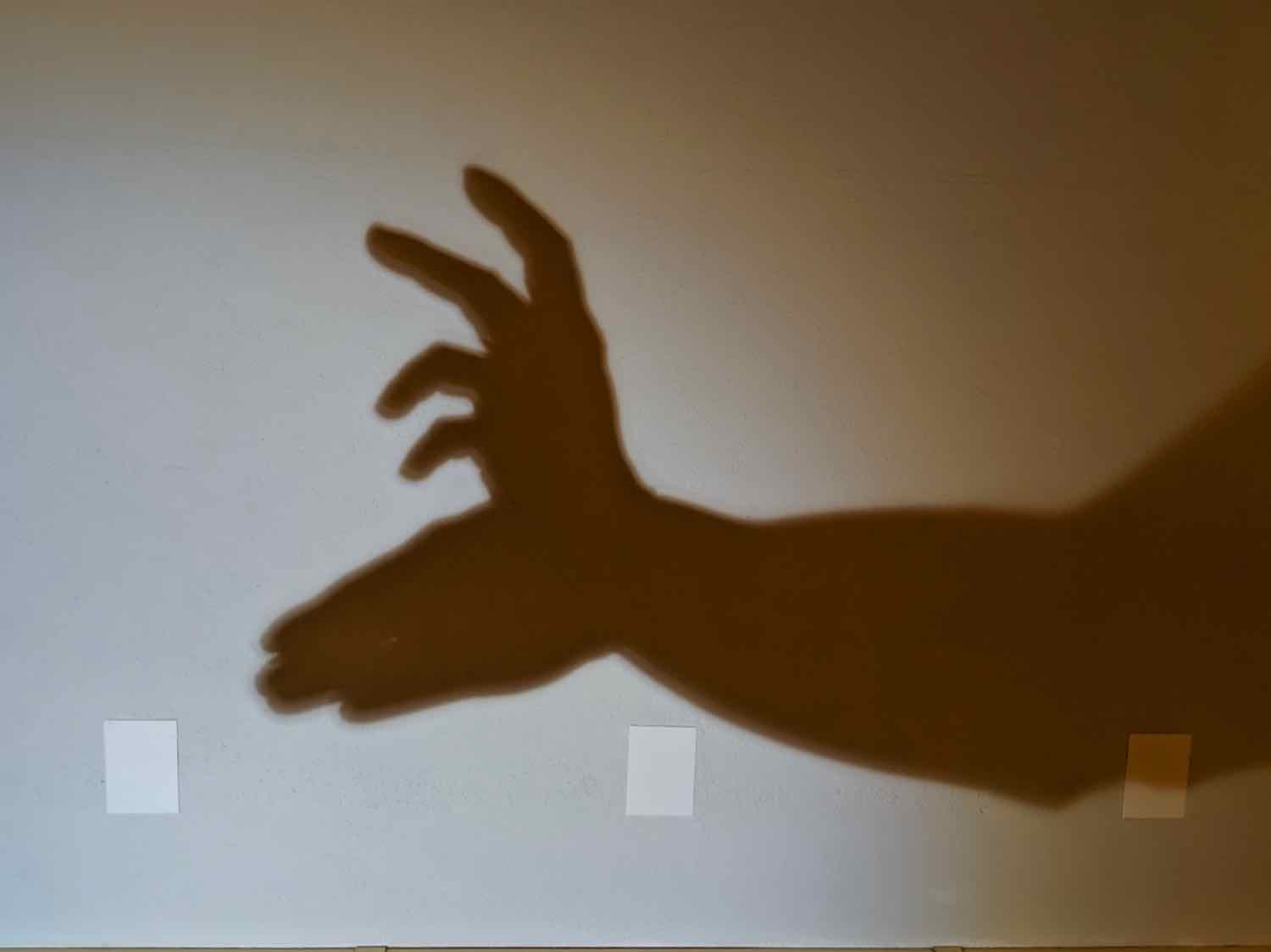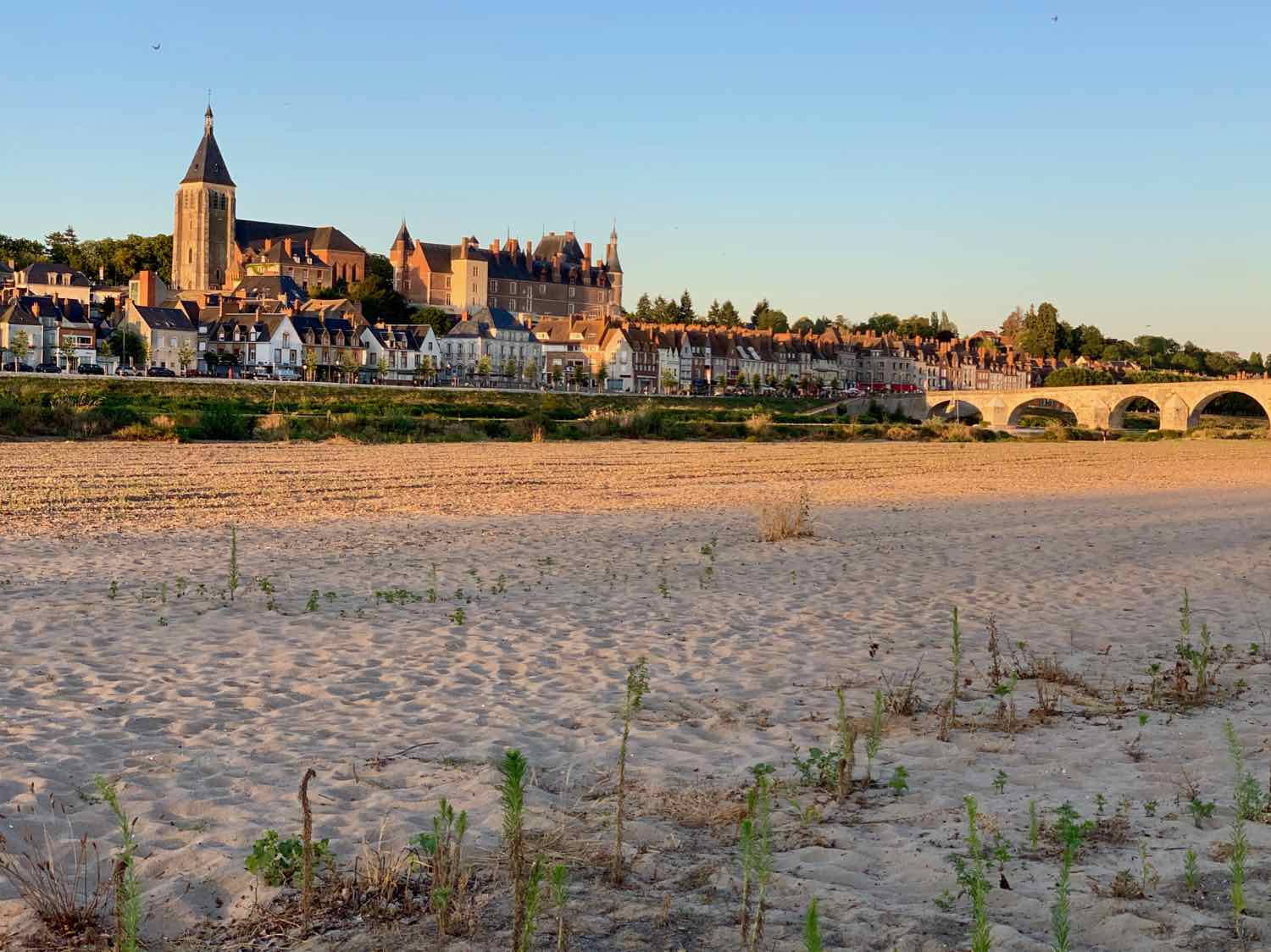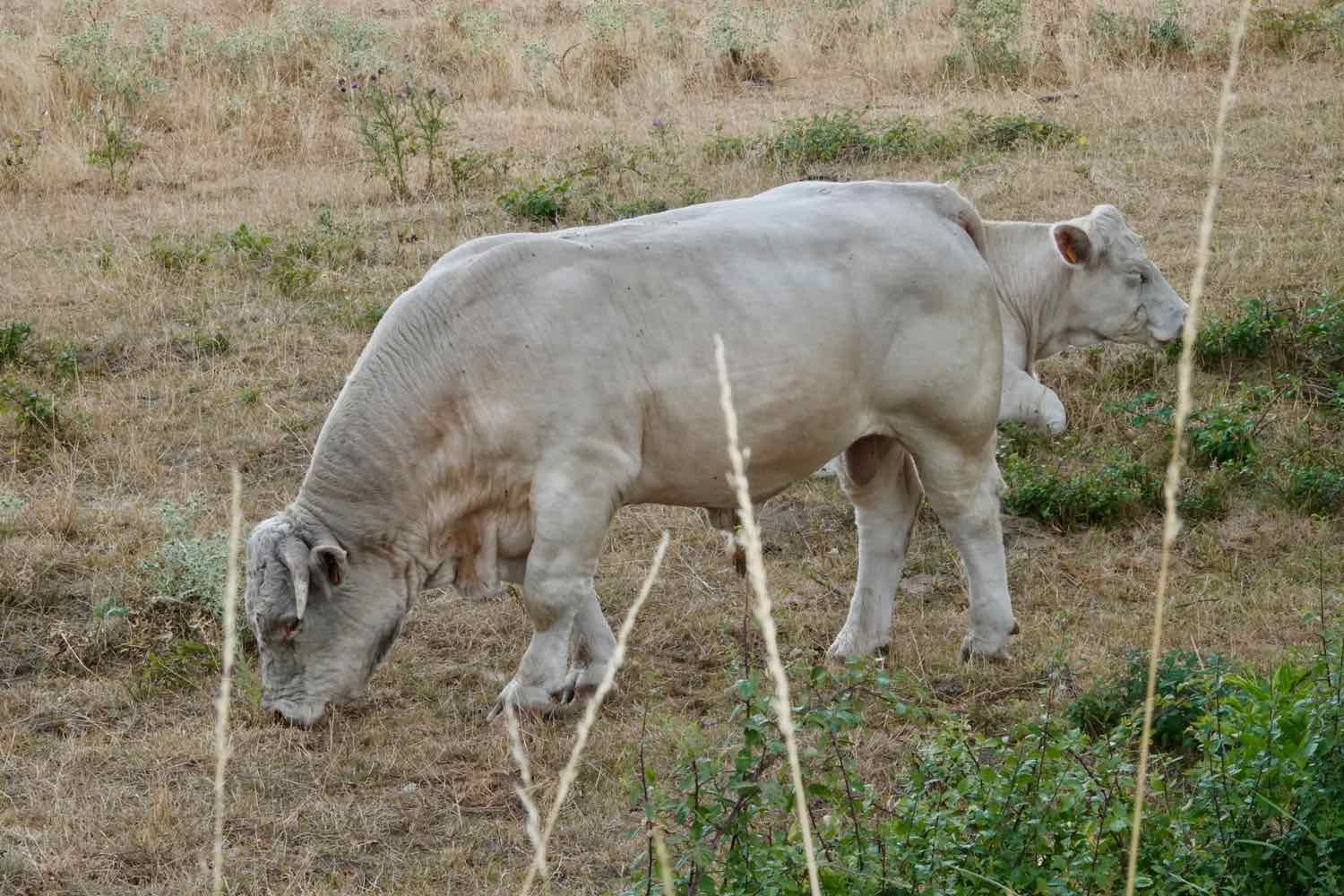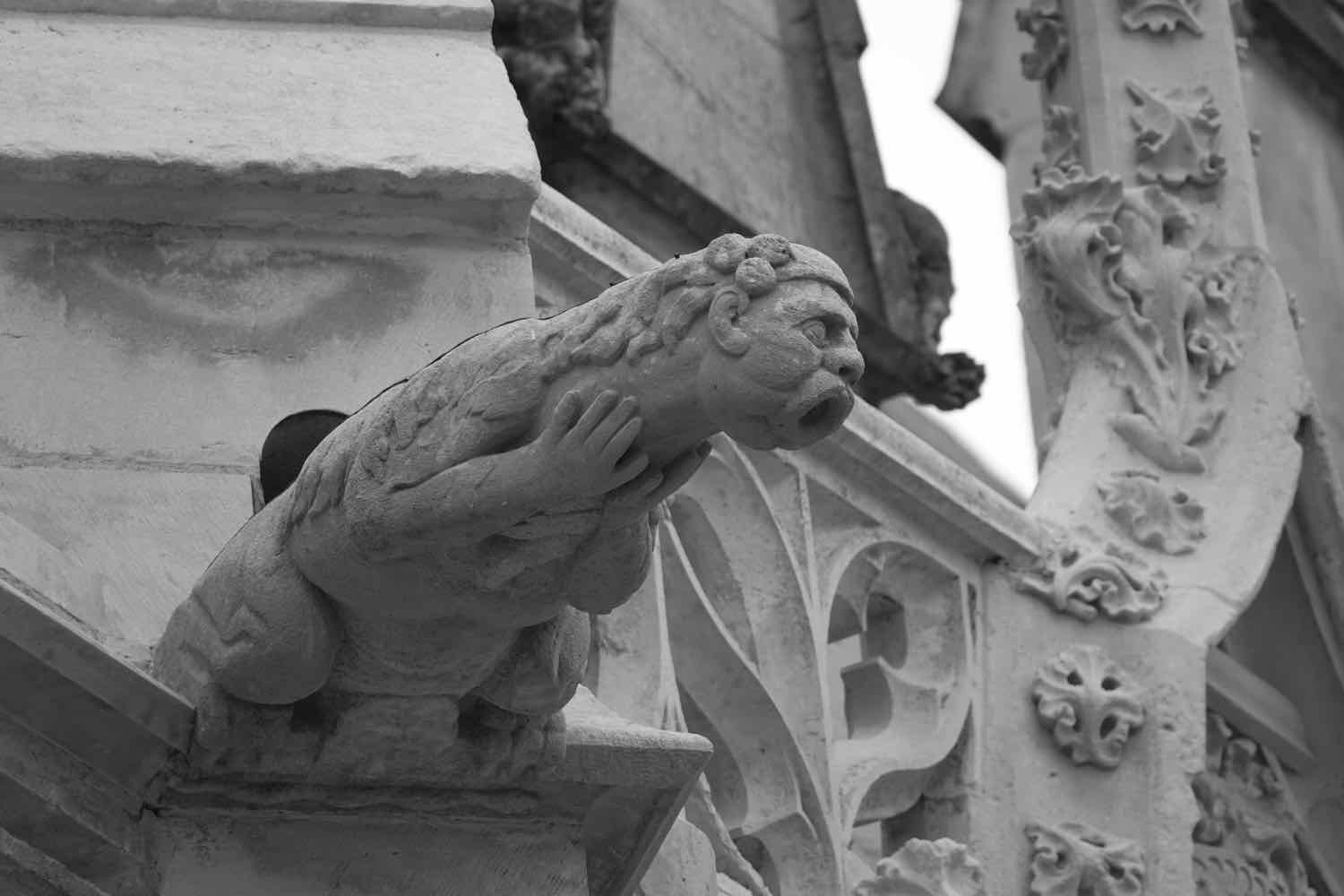Cycling Sully-sur-Loire to Nevers: In the Heart of Central France
29 July - 2 Aug 2019
Sully-sur-Loire to Gien (29 July 2019, 26 km, 16 mi)
It was a surprisingly chilly morning, at only 11.5 C (52 F). It makes for pleasant biking weather, but it seems a bit cool for the beginning of August. Is our summer over already? It only lasted about two weeks since we spent June and much of July up North in Scotland.
We’re still biking along the levees that border the Loire River. Although the levees are often set back from the main river channel, giving the river some room to move, they form a major feature of the landscape in the Loire Valley. Even though the Loire is considered a “wild” river because of the lack of major dams, the human impacts on the river are pretty substantial. There are lots of small water-management dams, in addition to the endless levees.
We biked for quite a while (20 km) before we reached a town where we could have breakfast. In Saint Gondon we found a tiny grocery. They didn’t have much on the shelves. We bought a baguette and some sliced ham, and had plain ham sandwiches with our leftover nectarines. The baguettes were filling, and nectarines were very juicy. So, all in all, it was a good breakfast.
Saint Gondon, France. Copyright © 2018-2019 Pedals and Puffins.
One reason it took us so long to find breakfast is that all the bakeries in the small towns that we passed through were closed, which is unusual. Maybe they’re closed Mondays? Or maybe we’re starting to see the affects of the August vacation season - where shops are closed while their proprietors go away for a holiday. We’re hoping food doesn’t become much more scarce.
While we ate our picnic breakfast in Saint Gondon, an older gentleman stopped to chat with us. He was out with his grandkids (ages 5 and 3.5) who were on pint-sized bikes. He was interested to learn that we planned to bike all the way to the Black Sea, and thanked us for visiting France. He reminded us of some of the small-town boosters we met in Kentucky, who were eager to be welcoming to visitors. He also asked if we were watching the Tour de France. He wondered if we had heard about the hailstorm which cut short stage 19, which was quite a big deal. We weren’t able to catch much of the tour on TV, but we had heard about the hailstorm. It was fun to share that connection with him.
Along the way, we stopped to read a sign along the trail that talked about nearby sights along the Loire. One upcoming attraction was a Museum of Hunting and Nature, in the chateau in the town Gien. That sounded interesting.
When we got to Gien, we’d only gone 26 km. But we decided to stop anyway, so we could visit the chateau’s museum. There was a campground conveniently located right along our route, and across the river from Gien. Perfect. Unfortunately, we arrived just at noon, and the receptionist was heading out for her 2 hr lunch break. She asked us to come back at 2pm to check in.
Rather than wait around for two hours, we headed back to the tent area of the campground, picked out a good site, set up our tent, and got all of our stuff unpacked and settled in. When we headed back to the reception area, we were thrilled to see that the clerk had returned before 2pm. We were able to check in, and then head over to Gien without a long wait.
The Gien Chateau looks pretty contemporary compared to most of the others we’ve seen along the Loire River. It’s constructed in brick, and major sections were reconstructed after bombing during WWII. Another reason it has a different look than many of the other chateaus is that it was originally built as a royal hunting lodge, rather than as a primary palace. But it’s worth noting that this is a pretty big, impressive, hunting lodge.
Chateau de Gien, France, seen from across the Loire River. Copyright © 2018-2019 Pedals and Puffins.
On our way to the chateau, we walked through an older section of Gien.
This mural, decorating a pedestrian archway, commemorates the reconstruction of the city after WWII. Gien, France. Copyright © 2018-2019 Pedals and Puffins.
We’re still in the zone of influence of Joan of Arc. And Gien has its own memorial to her, with Gien at the center, of course.
Joan of Arc visited Gien four times over the course of her adventures, including a stop in the city on her first trip to meet the future King of France. The plaque commemorates those events. Gien, France. Copyright © 2018-2019 Pedals and Puffins.
The Museum of Hunting and Nature was interesting, with rooms devoted to different types of hunting such as falconry, hunting with hounds, waterfowl hunting, etc. One of the things we learned was that falconry was very popular with women royalty, because it allowed them to hunt while still adhering to their society’s expectations of behavior and dress. We were reminded of something we had read in Scotland, about Mary Queen of Scots being very fond of falconry.
Red deer with hunting bugles. Gien, France. Copyright © 2018-2019 Pedals and Puffins.
A collection of hoods used in falconry. By covering their eyes, the hoods help to keep the birds calm. Each of these hoods was hand-made, often by the owner. Gien, France. Copyright © 2018-2019 Pedals and Puffins.
We had fun in one room of the museum that had a light shining on a white wall, and instructions on how to make different animals from hand shadows. It definitely takes some practice to get them right.
World War II had a big impact on Gien. There was a big battle here, when the Germans came to capture the bridge across the Loire. The city’s residents valiantly defended the bridge. The Germans took it, then were pushed back again by the army - keeping the Germans from gaining a river crossing at Gien. The town was devastated during the attacks, and there were lots of refugees. The Germans finally crossed the Loire further downriver, eliminating their need to take this bridge. But the town remains justly proud of its role in stopping the Germans from advancing through Gien.
A memorial to the city’s defenders during WWII. Gien, France. Copyright © 2018-2019 Pedals and Puffins.
There was a lovely bakery on the main square at the end of the bridge in Gien. We sat at one of their shaded tables and drank a couple of cold drinks, enjoying an afternoon break. Then we headed back across the Loire, and went to the restaurant at the campground for dinner. We followed up dinner with a carafe of red wine from the Gien region. Very French.
Giennois Wine, France. Copyright © 2018-2019 Pedals and Puffins.
We’re camping more along the Loire River than we did previously on this journey. A key reason is that there are lots of campgrounds along the route, and they are OPEN. When we traveled along the Atlantic coast of France in February/March, all of the campgrounds were still closed for the winter.
A unique aspect of French campgrounds is that they are rated with stars, just like hotels, based on the level of amenities. More stars means more frills like a pool, a restaurant, a playground and mini-golf. But the truth is that most of those things aren’t necessities. Two-star campgrounds usually have the really useful amenities like laundry machines and covered picnic areas. And oddly, some very important necessities, like toilet paper, don’t seem to factor into the star ratings. A surprising number of 3-star campgrounds don’t include toilet paper in the bathrooms - bring your own. On the other hand, the 2-star campgrounds we stayed at usually included toilet paper. We prefer 2-stars.
We’ve been surprised by how few people we see out on the water on the Loire. It’s a beautiful river, and it’s obviously a tourist attraction. Yet we’ve seen hardly anyone canoeing, kayaking or fishing. And there hasn’t been a single person tubing. You would see a lot more people out on the water in the U.S. Here in France, it’s all about the bicycles.
Gien to La Charité-sur Loire (30 July 2019, 83.7 km, 52 mi)
Once again, we ended up riding for quite a while before we reached a town with a bakery and a store. In Saint-Brisson-sur-Loire we found both. We helped ourselves to a breakfast of pastries from the bakery and bananas from the store.
A lot of the buildings in the towns along the Loire River look like they’re from another century. These structures were definitely built to last. Saint-Brisson-sur-Loire, France. Copyright © 2018-2019 Pedals and Puffins.
It was another day spent riding along levees, between the river (mostly bordered by trees) and agricultural lands. We’ve entered a part of the valley where there are very few towns. Towards the end of the ride, we rode through the Loire Valley Nature Reserve, which was bordered by trees on both sides of the levees.
But today we also had an interesting change of scenery. Above Saint-Firmin-sur-Loire, the Loire River is too shallow for most boats. Here the French dug the Loire Lateral Canal, which parallels the river for 196 km. The most fascinating feature was a Pont Canal (canal bridge) - a very long aqueduct that carried the canal over the Loire River. It was quite grand, with intricate statues adorning each end of the bridge. A couple of boats passed over the Loire while we were there. It’s kind of surreal to watch boats cross a river on a bridge. With all our biking along canals in the U.S., we’ve never seen a canal aqueduct this big.
The canal bridge, which carries the Loire Lateral Canal high above the Loire River - like a highway overpass for boats. Saint-Firmin-sur-Loire, France. Copyright © 2018-2019 Pedals and Puffins.
As we were admiring the canal bridge on the far side, a group of cyclists from Germany stopped to ask us about our trip. They were impressed with how much stuff we were carrying, and even more impressed when we told them we had started in Portugal and were heading to the Black Sea. They were biking up the Loire, then heading south to Geneva. That’s a pretty significant trip, too.
We saw TONS of other bike tourers today. They easily numbered a couple of hundred. There were some big groups. We’re still amazed at the contrast with our travels through Portugal, Spain, and the UK. We’re lucky there are enough campgrounds and other forms of lodging to absorb all these people. We’re worried what it will be like once August begins, and most of Europe goes on vacation.
The canal tow paths often have more trees than the levees along the Loire, which is a pleasant change. Briare, France. Copyright © 2018-2019 Pedals and Puffins.
A nice rest break along the Loire River. Ousson-sur-Loire, France. Copyright © 2018-2019 Pedals and Puffins.
We’re still amused by how graphic the images are on the warning signs in France. Don’t let that be you! Bonny-sur-Loire, France. Copyright © 2018-2019 Pedals and Puffins.
Old stone bridge. Bonny-sur-Loire, France. Copyright © 2018-2019 Pedals and Puffins.
PedalingGuy just cleaned his rear-view mirror. Looks good! Bonny-sur-Loire, France. Copyright © 2018-2019 Pedals and Puffins.
The upper Loire River is generally too shallow for anything but small, flat-bottomed boats. It’s the lateral canal that handles bigger boats like this one. Saint-Satur, France. Copyright © 2018-2019 Pedals and Puffins.
We had thought we might stop for the day at around 60 km. But we arrived at the campground pretty early. Also, the site was quite remote, with not much to do for the afternoon. So, we decided to push on, and ended up covering 84 km.
La Charité-sur-Loire, the town near our final stop, doesn’t seem very prosperous. There’s an old, burned down church, Notre Dame de La Charité, that used to be one of the biggest in France. But despite the fact that there is a sign that talks about the history of the church, it hasn’t been kept up. There were piles of old beams and stone in the open-air courtyard, making it look like a project to fix up the structure had stalled.
Town itself has lots of little stores. But many of the stores are closed. We are definitely starting to wonder whether things are closing up for the August holiday season.
We were actually happy to see a couple of fishermen out in the Loire this afternoon. They were fishing just below a small dam that was under the bridge at La Charité-sur-Loire. Over the past couple off days, we were wondering why there weren’t more people fishing along the river. Perhaps the water is cleaner up here, supporting more fish.
Fishermen in the Loire River. La Charité-sur-Loire, France. Copyright © 2018-2019 Pedals and Puffins.
View across the river. La Charité-sur-Loire, France. Copyright © 2018-2019 Pedals and Puffins.
Our campground has the typical arrangement, where most of the area is devoted to caravans and car camping. The tent campers are given space on a lawn near the river. Today, a large group of folks traveling by canoe showed up at the end of the day, and took over one end of the lawn. Luckily, we weren’t right next to them. So their activity didn’t affect us too much.
Our campsite. La Charité-sur-Loire, France. Copyright © 2018-2019 Pedals and Puffins.
La Charité-sur-Loire to Nevers (31 July 2019, 45.5 km, 28.3 mi)
We both slept pretty well. We were tired from the last few nights in campgrounds that were a bit noisy, in addition to the long biking day yesterday. This campground was busy until about 11pm, but then it became very quiet, and we slept peacefully.
We biked into the town of La Charité for breakfast, and found a very nice bakery, with a great selection of breakfast items. We enjoyed eating quiches and flan on a park bench before setting off on the trail.
We spent a lot more time riding along the canal today. And there were quite a few more boats out and about. They look like pretty typical recreational boats, rather than the specialized “narrow boats” that dominated the canals in the UK. The locks here are wider, and the canals deeper, to allow these bigger boats to get through.
A busy lock along the Loire Lateral Canal. Marseilles-lès-Aubigny, France. Copyright © 2018-2019 Pedals and Puffins.
Towards the end of the day we were back on the levees. And we discovered that someone has a gift for painting bugs. We saw several, very lifelike murals of oversized bugs painted on the sides of utility buildings. We thought that was pretty cool.
Back on the levees that contain the Loire River. Les Grevées, France. Copyright © 2018-2019 Pedals and Puffins.
For about 20 km, there was a new feature on the route. Brass plates, about six inches across, were embedded into the asphalt, counting down the kilometers. But to what? We weren’t sure what we would encounter when the numbers got to zero. Our route, EuroVelo 6, continues well beyond that. We were curious what we might find at the end of the trail.
Then, just over 29 km into the ride, we reached the official start of the Loire à Vélo bicycle route - the French route that is incorporated into this part of EuroVelo 6. We stopped to take some photos at the Kilometer 0 marker, in the tiny town of Cuffy. It seems like an eclectic choice for a place to start such a major biking trail. There are hardly any places to park. I guess a lot of people launch their trips from the city of Nevers, and bike to the start of the route - or have someone drop them off. Nevers to St. Bevin-les-Pins, on the Atlantic Ocean, makes up the official Loire à Vélo route.
Kilometer 0 on the Loire à Vélo. Cuffy, France. Copyright © 2018-2019 Pedals and Puffins.
The Loire River, near kilometer 0 on the Loire à Vélo bicycle route. Cuffy, France. Copyright © 2018-2019 Pedals and Puffins.
But our journey didn’t end at kilometer 0. Just down the road, we crossed another canal bridge over the Allier River, a major tributary of the Loire. On the bridge, we had a fun conversation with a couple bike tourers from Holland. They are long-time cycle tourists, having biked to Satiago de Compostela from the Netherlands, among other long rides. On this trip, they has started in the Netherlands, biked south through Paris to the Loire (EuroVelo 3), and were following EuroVelo 6 to the Rhine Route (EuroVelo 15), where they would turn back north to the Netherlands. They planned to cover all of that distance in 5 weeks. They’re cycling about as many kilometers as we are per day, but probably not taking as many rest days as we are. They had cycled every day through the extreme heat wave, when we hunkered down at the hotel in Tours. But they did say that they tried to finish riding each day by early afternoon, and they also stayed in hotels to avoid the worst of the heat.
Cycling tourers from the Netherlands. We met on a canal bridge over the Allier River, Cuffy, France. Copyright © 2018-2019 Pedals and Puffins.
While we were watching the boats along the canal, a person on one of the boats waved to PedalingGuy. She wanted to toss him a rope, to help tie off the boat while they awaited their turn to go through a lock. Catching on quickly, PedalingGuy grabbed the rope and helped pull the boat towards shore. It gave us the feeling of being a little bit closer to the life of the people who use the canal - which can often seem like a totally different world from the one we inhabit along the banks.
PedalingGuy helped secure a boat to shore, as they waited their turn to go through a lock in the canal. Gimouille, France. Copyright © 2018-2019 Pedals and Puffins.
At 41 km we turned north along a branch canal that leads into the city of Nevers, and checked into our hotel.
Nevers (1 - 2 August 2019)
We spent most of our time in Nevers catching up on errands and planning the next week of rides. But we did take some time to walk into town and visit a few of the sights.
A group of bicycle tourers crossing the Loire River in Nevers, France. They’ve got the ubiquitous Ortlieb panniers. Copyright © 2018-2019 Pedals and Puffins.
Lots of towns along the Loire River have sandy beaches, with playgrounds and snack bars set up for the season. The beach in Nevers was particularly festive looking with its multi-colored umbrellas. Nevers, France. Copyright © 2018-2019 Pedals and Puffins.
This old, shell of a building on the Nevers waterfront had a sign announcing how General Napoleon Bonaparte had once stayed here. These days, the building is dilapidated and falling apart, but its historic significance could make it hard to renovate. We wondered what the future would hold for a building like this. Nevers, France. Copyright © 2018-2019 Pedals and Puffins.
The Cathedral of Saint Cyr and Saint Julitte in Nevers is full of interesting details. On the outside, there are numerous, imaginative gargoyles serving as water spouts, with their mouths open to spill rainwater from the roof out onto the street.
Inside the cathedral, stoic-looking peasants hold up the bases of the columns that support the vaulted ceiling.
And all of the cathedral’s stained glass is very modern. While many of the panels depict bible stories - a traditional role for stained glass in churches - the styles are unlike anything that would have been produced in the Middle Ages or the Renaissance. It turns out the church had to be rebuilt numerous times - most recently from WWII, when most of the older glass was replaced with a more modern look.
Both days that we were in Nevers, we bought sandwiches for lunch and ate them by the fountain in the city’s central park.
Parc Rogers Salengro. Nevers, France. Copyright © 2018-2019 Pedals and Puffins.
In the center of the park, the Coney Island Ferris Wheel pulled us in. We went for a spin, gazing out on the Loire Valley from the heights of the wheel.
Nevers was a major producer of earthenware and pottery over the centuries. The city pays homage to this history with examples of fine pottery in glass-topped cases that are embedded into the sidewalks. You can walk right over them.
A pottery display, embedded in the sidewalk. Nevers, France. Copyright © 2018-2019 Pedals and Puffins.
A diverse collection of fun bug sculptures graced the gardens at the Place de la République. Nevers, France. Copyright © 2018-2019 Pedals and Puffins.































